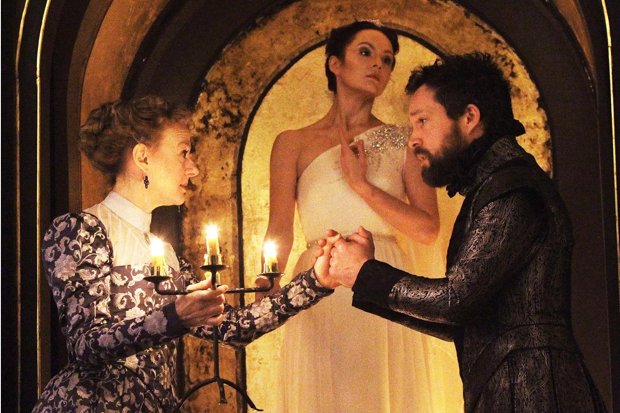The Winter’s Tale, at Sam Wanamaker Playhouse, SE1
reviewed for The Times, 8th February 2016

Niamh Cusack (Paulina), Rachael Stirling (Hermione) and John Light (Leontes) in The Winter’s Tale
Marilyn Kingwill
![]()
I’ve always loved The Winter’s Tale, but not everyone does. The rift in tone from tragic closet drama to rambunctious low comedy is tricky to pull off at the best of times. The Globe’s latest production, however, taps Shakespeare’s play for its darkest existential dilemmas. John Light’s neurotic, self-loathing Leontes is a revelation, while Michael Longhurst’s fierce production is a masterclass in how to use the Sam Wanamaker Playhouse to illuminate a play written for Shakespeare’s move into an indoor space.
Imagine Othello transformed into a redemptive fairytale, and you have an idea of the plot. The watchful King Leontes suspects his wife of having an affair with his best friend, King Polixenes — and thus this play, like Othello, is riddled with anxieties about how we test the truth. Do we know things when we see them? Can our eyes deceive us? So Longhurst’s production draws much of its power from the chiaroscuro cast in a theatre lit only by candlelight. The formality of Leontes’s court bristles with implicit violence, suddenly close to us in this confined, small space. Blink in the half-light and you might even believe you’re seeing a man pursued by a bear.
Driving the initial tragedy is Light’s bitterly self-divided Leontes. He’s an unstable, insecure king from the start, like Hamlet seeing a ghost and not knowing whether to believe it. Meanwhile, Paulina is the only person who will defend Leontes’s slandered queen, Hermione (a dignified Rachael Stirling, dragged, at one point, bleeding from her childbed). Niamh Cusack gives us wit and nerve, although it’s odd again to see Paulina double, as is fashionable, as the figure of Time. As Cusack suggests elsewhere, she’s not an omniscient goddess, but like her counterpart Camillo (a charming Fergal McElherron) an opportunistic survivor, making up redemption as she goes along.
As the scene shifts from the bitter winter of Sicilia to the hopeful harvest-time of Bohemia, the play lends itself less easily to the interior space. Yokels chew the scenery, although mercifully the Globe regular James Garnon wryly strips the usual bombast from trickster Autolycus. As Perdita, Leontes’s lost daughter, Tia Bannon is fresh-faced enough but dilutes Perdita’s knowingness — and there’s little pagan sexuality at this fertility feast. Similarly, Simon Armstrong’s Polixenes is an insufficient mirror for Light’s Leontes; the menace of his own erotic jealousies hardly registers. Yet this is still a must-see production. I wept.






